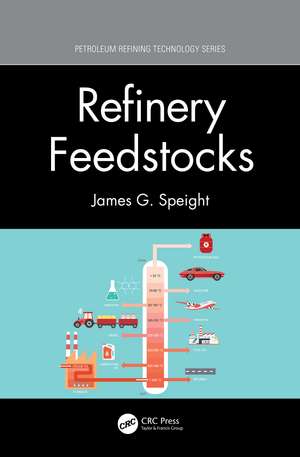Refinery Feedstocks: Petroleum Refining Technology Series
Autor James G. Speighten Limba Engleză Paperback – aug 2022
Refinery Feedstocks addresses the problems of changing feedstock availability and properties; the refining process; and solids deposition during refining. This book will take the reader through the various steps that are necessary for crude oil evaluation and refining including the potential for the use of coal liquids, shale oil, and non-fossil fuel materials (biomass) as refinery feedstocks.
Other features:
- Describes the various types of crude oil and includes a discussion of extra heavy oil and tar sand bitumen
- Includes basic properties and specifications of crude oil and the significance in refinery operations
| Toate formatele și edițiile | Preț | Express |
|---|---|---|
| Paperback (1) | 403.17 lei 43-57 zile | |
| CRC Press – aug 2022 | 403.17 lei 43-57 zile | |
| Hardback (1) | 1326.99 lei 43-57 zile | |
| CRC Press – 21 oct 2020 | 1326.99 lei 43-57 zile |
Preț: 403.17 lei
Preț vechi: 517.22 lei
-22% Nou
Puncte Express: 605
Preț estimativ în valută:
77.15€ • 80.06$ • 64.49£
77.15€ • 80.06$ • 64.49£
Carte tipărită la comandă
Livrare economică 17-31 martie
Preluare comenzi: 021 569.72.76
Specificații
ISBN-13: 9780367561017
ISBN-10: 0367561018
Pagini: 370
Ilustrații: 90
Dimensiuni: 178 x 254 mm
Greutate: 0.68 kg
Ediția:1
Editura: CRC Press
Colecția CRC Press
Seria Petroleum Refining Technology Series
ISBN-10: 0367561018
Pagini: 370
Ilustrații: 90
Dimensiuni: 178 x 254 mm
Greutate: 0.68 kg
Ediția:1
Editura: CRC Press
Colecția CRC Press
Seria Petroleum Refining Technology Series
Public țintă
Professional Practice & DevelopmentCuprins
Preface. Author. PART 1 Feedstocks – Evaluation and Properties. Chapter 1 Natural Gas, Crude Oil, Heavy Crude Oil, Extra-Heavy Crude Oil, and Tar Sand Bitumen. Chapter 2 Feedstock Evaluation. Chapter 3 Feedstock Composition. Chapter 4 Asphaltene Constituents in Feedstocks. Chapter 5 Instability and Incompatibility. Chapter 6 Introduction to Refining Processes. Chapter 7 Feedstock Chemistry in the Refinery. Chapter 8 Refinery Reactors. PART 2 Feedstocks in the Future Refinery. Chapter 9 Alternate Feedstocks. Chapter 10 Feedstock Integration in the Refinery. Glossary. Conversion Factors. Index.
Notă biografică
Dr. James G. Speight has doctorate degrees in Chemistry, Geological Sciences, and Petroleum Engineering and is the author of more than 75 books in petroleum science, petroleum engineering, and environmental sciences. He has more than fifty years of experience in areas associated with (i) the properties, recovery, and refining of reservoir fluids, conventional petroleum, heavy oil, and tar sand bitumen, (ii) the properties and refining of natural gas, gaseous fuels, (iii) the production and properties of petrochemicals, and (iv) the properties and refining of biomass, biofuels, biogas, and the generation of bioenergy. His work has also focused on safety issues, environmental effects, remediation, and safety issues as well as reactors associated with the production and use of fuels and biofuels. He is the author of more than 70 books in petroleum science, petroleum engineering, biomass and biofuels, environmental sciences.
Although he has always worked in private industry which focused on contract-based work, he has served as Adjunct Professor in the Department of Chemical and Fuels Engineering at the University of Utah and in the Departments of Chemistry and Chemical and Petroleum Engineering at the University of Wyoming. In addition, he was a Visiting Professor in the College of Science, University of Mosul, Iraq and has also been a Visiting Professor in Chemical Engineering at the following universities: University of Missouri-Columbia, the Technical University of Denmark, and the University of Trinidad and Tobago.
Dr. Speight was elected to the Russian Academy of Sciences in 1996 and awarded the Gold Medal of Honor that same year for outstanding contributions to the field of petroleum sciences. He has also received the Scientists without Borders Medal of Honor of the Russian Academy of Sciences. In 2001, the Academy also awarded Dr. Speight the Einstein Medal for outstanding contributions and service in the field of Geological Sciences.
Although he has always worked in private industry which focused on contract-based work, he has served as Adjunct Professor in the Department of Chemical and Fuels Engineering at the University of Utah and in the Departments of Chemistry and Chemical and Petroleum Engineering at the University of Wyoming. In addition, he was a Visiting Professor in the College of Science, University of Mosul, Iraq and has also been a Visiting Professor in Chemical Engineering at the following universities: University of Missouri-Columbia, the Technical University of Denmark, and the University of Trinidad and Tobago.
Dr. Speight was elected to the Russian Academy of Sciences in 1996 and awarded the Gold Medal of Honor that same year for outstanding contributions to the field of petroleum sciences. He has also received the Scientists without Borders Medal of Honor of the Russian Academy of Sciences. In 2001, the Academy also awarded Dr. Speight the Einstein Medal for outstanding contributions and service in the field of Geological Sciences.
Descriere
Presents a description of the various types of crude oil and also includes a discussion of extra heavy oil and tar sand bitumen. Basic properties and specifications of crude oil and refinery products and their significance in refinery operations are provided.






